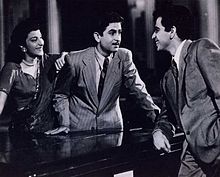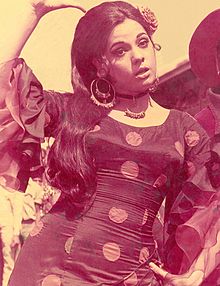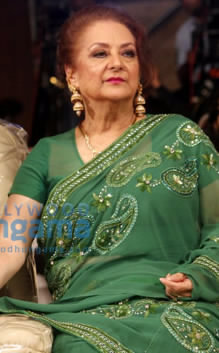SuvarnaTeja
BANNED

- Joined
- Oct 7, 2018
- Messages
- 4,310
- Reaction score
- -42
- Country
- Location
Nargis
From Wikipedia, the free encyclopedia
Jump to navigationJump to search
This article is about the Indian actress. For other uses, see Nargis (disambiguation).
Nargis

Born Fatima Rashid
1 June 1929
Calcutta, Bengal Presidency, British India
(now Kolkata, West Bengal, India)
Died 3 May 1981 (aged 51)
Bombay, Maharashtra, India
Cause of death Pancreatic cancer
Resting place Badakabarastan, Marine Lines, Bombay
Nationality Indian
Occupation Actress
Years active 1935, 1942–1968
Notable work
Sunil Dutt (m. 1958–1981)
(her death)
Children Sanjay Dutt
Priya Dutt
Namrata Dutt
Parents
Awards
Honours Padma Shri (1958)
Nargis Dutt[1] (born Fatima Rashid; 1 June 1929 – 3 May 1981)[2] was an Indian film actress, who starred in classic films of Bollywood. Regarded as one of the greatest actresses in the history of Hindi cinema, she made her screen debut in a minor role at the age of 5 with Talash-E-Haq (1935), but her acting career actually began with the film Tamanna (1942).
In a career that spanned three decades, Nargis appeared in numerous commercially successful as well as critically acclaimed films, many of which featured her alongside actor Raj Kapoor. She was the younger sister of the well-known actor Anwar Hussain. Her best-known role was that of Radha in the Academy Award-nominated Mother India (1957), a performance that won her the Filmfare Award for Best Actress. She would appear infrequently in films during the 1960s. Some of her films of this period include the drama Raat Aur Din (1967), for which she received the inaugural National Film Award for Best Actress.
Nargis married her Mother India co-star Sunil Dutt in 1958. Together they had three children, including the actor Sanjay Dutt. Along with her husband, Nargis formed the Ajanta Arts Culture Troupe which roped in several leading actors and singers of the time and held stage shows at border areas. In early 1970s, Nargis became the first patron of The Spastic Society of India and her subsequent work with the organisation brought her recognition as a social worker and later a Rajya Sabha nomination in 1980.
Nargis died in 1981 of pancreatic cancer, only three days before her son Sanjay Dutt made his debut in Hindi films with the film Rocky. In 1982, the Nargis Dutt Memorial Cancer Foundation was established in her memory. The award for Best Feature Film on National Integration in the Annual Film Awards ceremony is called the Nargis Dutt Award in her honor.
Contents
Nargis was born as Fatima Rashid in Calcutta, Bengal (now Kolkata, West Bengal). Her father Abdul Rashid (born Mohanchand Uttamchand Tyagi alias Mohan Babu), was originally a wealthy Mohyal Brahmin (a Punjabi Hindu), from Rawalpindi, Punjab (now in Pakistan) who had converted to Islam.[1][3][4][5] Her mother was Jaddanbai, a Hindustani classical music singer and one of the early pioneers of Indian cinema.[6] Nargis' family then moved to Allahabad from West Punjab. She introduced Nargis into the movie culture unfolding in India at the time. Nargis' maternal half-brother, Anwar Hussain (1928–1988), also became a film actor.
Career[edit]

Nargis, Raj Kapoor and Dilip Kumar in a scene from the film Andaz (1949)
Fatima made her first film appearance in the 1935 film Talashe Haq when she was six years old, credited as Baby Nargis. Nargis (نرگس [ˈnərɡɪs]) is a Persian word meaning Narcissus, the daffodil flower. She was subsequently credited as Nargis in all of her films.
Nargis appeared in numerous films after her debut; she won lasting fame for her later, adult, roles, starting with at the age of 14, in Mehboob Khan's Taqdeer in 1943 opposite, Motilal.[7] She starred in many popular Hindi films of the late 1940s and 1950s such as Barsaat (1949), Andaz (1949), Awaara (1951), Deedar (1951), Shree 420 (1955), and Chori Chori (1956). She appeared in Mehboob Khan's Oscar-nominated epic drama Mother India in 1957 for which she won the Filmfare Best Actress Award for her performance. Baburao Patel of the film magazine Filmindia (December 1957) described Mother India as "the greatest picture produced in India" and wrote that no other actress would have been able to perform the role as well as Nargis.[8]
After her marriage to Sunil Dutt in 1958, Nargis gave up her film career to settle down with her family, after her last few films were released. She made her last film appearance in the 1967 film Raat Aur Din. The film was well received and Nargis' performance as a woman who has dissociative identity disorder was critically acclaimed. For this role she won a National Film Award for Best Actress and became the first actress to win in this category. She also received a Filmfare Best Actress Award nomination for this film.
In 2011, Rediff.com listed her as the greatest actress of all time, stating, "An actress with range, style, grace and an incredibly warm screen presence, Nargis is truly a leading lady to celebrate."[9] M.L. Dhawan from The Tribune said, "In almost all her films Nargis created a woman who could be desired and deified. The charisma of Nargis's screen image lay in that it oscillated between the simple and the chic with equal ease."[10]
She was also nominated to the Rajya Sabha (Upper house of Indian Parliament) from 1980–81[2][11] but due to cancer she fell ill and died during her tenure.[12]
Personal life[edit]
Nargis had a long-time relationship with actor Raj Kapoor, who was her co-star in the films Awara and Shree 420. Raj Kapoor was married and had children. After he refused to divorce his wife, Nargis ended their year-long relationship.[13][14][15]
Nargis married actor Sunil Dutt (a Mohyal from Jhelum, British India) on 11 March 1958. Reportedly, Dutt had saved her life from a fire on the sets of Mother India.[16] They married on 11 March 1958.[17] Three children were born from their union: Sanjay, Namrata, and Priya.
Sanjay went on to become a successful film actor. Namrata married actor Kumar Gaurav, son of veteran actor Rajendra Kumar who had appeared alongside Nargis and Sunil Dutt in Mother India. Priya became a politician and a Member of Parliament (Lok Sabha).[16]
With her husband, Nargis formed the Ajanta Arts Cultural Troupe, which involved several leading actors and singers of the time, and performed at remote frontiers to entertain the Indian soldiers at border. It was the first troupe to perform in Dhaka, after the liberation war of Bangladesh in 1971.[18] Later, Nargis worked for the cause of spastic children. She became the first patron of The Spastics Society of India. Her charitable work for the organisation got her recognition as a social worker.[18]
Death[edit]
Nargis was diagnosed with pancreatic cancer in 1980 and underwent treatment for the disease at Memorial Sloan-Kettering Cancer Center in New York. Upon her return to India, her condition deteriorated and she was admitted at Breach Candy Hospital in Bombay. Nargis went into coma on 2 May 1981 after she became seriously ill and died the next day. Less than a week after her death, on 7 May 1981, at the premiere of her son's debut film Rocky, one seat was kept vacant for her.
Nargis was buried at Badakabarastan in Marine Lines, Mumbai. [16] A street in Bandra, Mumbai, was renamed Nargis Dutt Road in her memory.
One year after her death, The Nargis Dutt Memorial Cancer Foundation (Barshi Maharashtra) was established by Sunil Dutt in her memory. Though it is widely believed Nargis died of cancer, recently her daughter Namrata clarified that she had fought the pancreatic cancer successfully but died from a urinary tract infection due to lowered immunity levels.[19][20]
In popular culture[edit]
Nargis was played by actress Manisha Koirala in the film Sanju, the biopic of her son, Sanjay Dutt. The film is ranked as one of the highest grossing Indian film of 2018.[21][22]
Awards and recognitions[edit]
The National Film Awards honoured Dutt by instituting the Nargis Dutt Award for Best Feature Film on National Integration upon her achievement in Hindi Cinema.[26]
Filmography[edit]
From Wikipedia, the free encyclopedia
Jump to navigationJump to search
This article is about the Indian actress. For other uses, see Nargis (disambiguation).
Nargis

Born Fatima Rashid
1 June 1929
Calcutta, Bengal Presidency, British India
(now Kolkata, West Bengal, India)
Died 3 May 1981 (aged 51)
Bombay, Maharashtra, India
Cause of death Pancreatic cancer
Resting place Badakabarastan, Marine Lines, Bombay
Nationality Indian
Occupation Actress
Years active 1935, 1942–1968
Notable work
- Aag (1948)
- Barsaat (1949)
- Awara (1951)
- Aah (1952)
- Shree 420 (1955)
- Chori Chori (1956)
- Mother India (1957)
- Raat Aur Din (1967)
Sunil Dutt (m. 1958–1981)
(her death)
Children Sanjay Dutt
Priya Dutt
Namrata Dutt
Parents
- Abdul Rashid (father)
- Jaddanbai Hussein[1] (mother)
Awards
Honours Padma Shri (1958)
Nargis Dutt[1] (born Fatima Rashid; 1 June 1929 – 3 May 1981)[2] was an Indian film actress, who starred in classic films of Bollywood. Regarded as one of the greatest actresses in the history of Hindi cinema, she made her screen debut in a minor role at the age of 5 with Talash-E-Haq (1935), but her acting career actually began with the film Tamanna (1942).
In a career that spanned three decades, Nargis appeared in numerous commercially successful as well as critically acclaimed films, many of which featured her alongside actor Raj Kapoor. She was the younger sister of the well-known actor Anwar Hussain. Her best-known role was that of Radha in the Academy Award-nominated Mother India (1957), a performance that won her the Filmfare Award for Best Actress. She would appear infrequently in films during the 1960s. Some of her films of this period include the drama Raat Aur Din (1967), for which she received the inaugural National Film Award for Best Actress.
Nargis married her Mother India co-star Sunil Dutt in 1958. Together they had three children, including the actor Sanjay Dutt. Along with her husband, Nargis formed the Ajanta Arts Culture Troupe which roped in several leading actors and singers of the time and held stage shows at border areas. In early 1970s, Nargis became the first patron of The Spastic Society of India and her subsequent work with the organisation brought her recognition as a social worker and later a Rajya Sabha nomination in 1980.
Nargis died in 1981 of pancreatic cancer, only three days before her son Sanjay Dutt made his debut in Hindi films with the film Rocky. In 1982, the Nargis Dutt Memorial Cancer Foundation was established in her memory. The award for Best Feature Film on National Integration in the Annual Film Awards ceremony is called the Nargis Dutt Award in her honor.
Contents
- 1Early life and background
- 2Career
- 3Personal life
- 4Death
- 5In popular culture
- 6Awards and recognitions
- 7Filmography
- 8Further reading
- 9References
- 10External links
Nargis was born as Fatima Rashid in Calcutta, Bengal (now Kolkata, West Bengal). Her father Abdul Rashid (born Mohanchand Uttamchand Tyagi alias Mohan Babu), was originally a wealthy Mohyal Brahmin (a Punjabi Hindu), from Rawalpindi, Punjab (now in Pakistan) who had converted to Islam.[1][3][4][5] Her mother was Jaddanbai, a Hindustani classical music singer and one of the early pioneers of Indian cinema.[6] Nargis' family then moved to Allahabad from West Punjab. She introduced Nargis into the movie culture unfolding in India at the time. Nargis' maternal half-brother, Anwar Hussain (1928–1988), also became a film actor.
Career[edit]

Nargis, Raj Kapoor and Dilip Kumar in a scene from the film Andaz (1949)
Fatima made her first film appearance in the 1935 film Talashe Haq when she was six years old, credited as Baby Nargis. Nargis (نرگس [ˈnərɡɪs]) is a Persian word meaning Narcissus, the daffodil flower. She was subsequently credited as Nargis in all of her films.
Nargis appeared in numerous films after her debut; she won lasting fame for her later, adult, roles, starting with at the age of 14, in Mehboob Khan's Taqdeer in 1943 opposite, Motilal.[7] She starred in many popular Hindi films of the late 1940s and 1950s such as Barsaat (1949), Andaz (1949), Awaara (1951), Deedar (1951), Shree 420 (1955), and Chori Chori (1956). She appeared in Mehboob Khan's Oscar-nominated epic drama Mother India in 1957 for which she won the Filmfare Best Actress Award for her performance. Baburao Patel of the film magazine Filmindia (December 1957) described Mother India as "the greatest picture produced in India" and wrote that no other actress would have been able to perform the role as well as Nargis.[8]
After her marriage to Sunil Dutt in 1958, Nargis gave up her film career to settle down with her family, after her last few films were released. She made her last film appearance in the 1967 film Raat Aur Din. The film was well received and Nargis' performance as a woman who has dissociative identity disorder was critically acclaimed. For this role she won a National Film Award for Best Actress and became the first actress to win in this category. She also received a Filmfare Best Actress Award nomination for this film.
In 2011, Rediff.com listed her as the greatest actress of all time, stating, "An actress with range, style, grace and an incredibly warm screen presence, Nargis is truly a leading lady to celebrate."[9] M.L. Dhawan from The Tribune said, "In almost all her films Nargis created a woman who could be desired and deified. The charisma of Nargis's screen image lay in that it oscillated between the simple and the chic with equal ease."[10]
She was also nominated to the Rajya Sabha (Upper house of Indian Parliament) from 1980–81[2][11] but due to cancer she fell ill and died during her tenure.[12]
Personal life[edit]
Nargis had a long-time relationship with actor Raj Kapoor, who was her co-star in the films Awara and Shree 420. Raj Kapoor was married and had children. After he refused to divorce his wife, Nargis ended their year-long relationship.[13][14][15]
Nargis married actor Sunil Dutt (a Mohyal from Jhelum, British India) on 11 March 1958. Reportedly, Dutt had saved her life from a fire on the sets of Mother India.[16] They married on 11 March 1958.[17] Three children were born from their union: Sanjay, Namrata, and Priya.
Sanjay went on to become a successful film actor. Namrata married actor Kumar Gaurav, son of veteran actor Rajendra Kumar who had appeared alongside Nargis and Sunil Dutt in Mother India. Priya became a politician and a Member of Parliament (Lok Sabha).[16]
With her husband, Nargis formed the Ajanta Arts Cultural Troupe, which involved several leading actors and singers of the time, and performed at remote frontiers to entertain the Indian soldiers at border. It was the first troupe to perform in Dhaka, after the liberation war of Bangladesh in 1971.[18] Later, Nargis worked for the cause of spastic children. She became the first patron of The Spastics Society of India. Her charitable work for the organisation got her recognition as a social worker.[18]
Death[edit]
Nargis was diagnosed with pancreatic cancer in 1980 and underwent treatment for the disease at Memorial Sloan-Kettering Cancer Center in New York. Upon her return to India, her condition deteriorated and she was admitted at Breach Candy Hospital in Bombay. Nargis went into coma on 2 May 1981 after she became seriously ill and died the next day. Less than a week after her death, on 7 May 1981, at the premiere of her son's debut film Rocky, one seat was kept vacant for her.
Nargis was buried at Badakabarastan in Marine Lines, Mumbai. [16] A street in Bandra, Mumbai, was renamed Nargis Dutt Road in her memory.
One year after her death, The Nargis Dutt Memorial Cancer Foundation (Barshi Maharashtra) was established by Sunil Dutt in her memory. Though it is widely believed Nargis died of cancer, recently her daughter Namrata clarified that she had fought the pancreatic cancer successfully but died from a urinary tract infection due to lowered immunity levels.[19][20]
In popular culture[edit]
Nargis was played by actress Manisha Koirala in the film Sanju, the biopic of her son, Sanjay Dutt. The film is ranked as one of the highest grossing Indian film of 2018.[21][22]
Awards and recognitions[edit]
- 1958 – Filmfare Best Actress Award for Mother India[23]
- 1958 – She was the first film actress to conferred by the Government of India with the Padma Shri title, the fourth highest civilian award.[7]
- 1968 – National Film Award for Best Actress for Raat Aur Din.[7]
- 1969 – Nominated, Filmfare Best Actress Award for Raat Aur Din[citation needed]
- 2001 – "Best Artists of the Millennium" award by Hero Honda and film magazine Stardust along with actor Amitabh Bachchan.[24]
The National Film Awards honoured Dutt by instituting the Nargis Dutt Award for Best Feature Film on National Integration upon her achievement in Hindi Cinema.[26]
Filmography[edit]
- Talashe Haq (1935)
- Madam Fashion (1936)
- Taqdeer (1943)
- Humayun (1945)
- Bisvi Sadi (1945)
- Ramayani (1945)
- Nargis (1946)
- Mehandi (1947)
- Mela (1948)
- Anokha Pyar (1948)
- Anjuman (1948)
- Aag (1948)
- Roomal (1949)
- Lahore (1949)
- Darogaji (1949)
- Barsaat (1949)
- Andaz (1949)
- Pyaar (1950)
- Meena Bazaar (1950)
- Khel (1950)
- Jogan (1950)
- Jan Pahchan (1950)
- Chhoti Bhabhi (1950)
- Babul (1950)
- Aadhi Raat (1950)
- Saagar (1951)
- Pyar Ki Baaten (1951)
- Hulchul (1951)
- Deedar (1951)
- Awaara (1951)
- Sheesha (1952)
- Bewafaa (1952)
- Ashiana (1952)
- Anhonee (1952)
- Amber (1952)
- Shikast (1953)
- Paapi (1953)
- Dhoon (1953)
- Aah (1953)
- Angarey (1954)
- Shree 420 (1955)
- Jagte Raho (1956)
- Chori Chori (1956)
- Pardesi
- Mother India (1957)
- Lajwanti (1958)
- Ghar Sansar (1958)
- Adalat (1958)
- Yaadein (1964)
- Raat Aur Din (1967)
- Tosa oneira stous dromous (1968)







